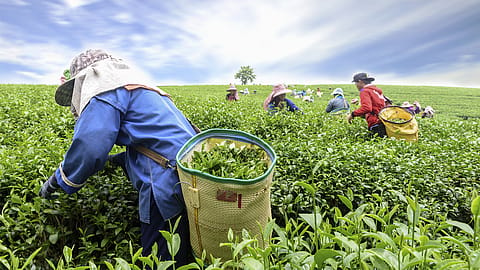Tea blossom extracts rich in potent bioactive compounds, can be natural energy boosters, finds study
A study led by Nagaland University reveals that tea blossoms, rich in bioactive compounds, can serve as natural energy boosters and health supplements.

A Nagaland University led multi-institute research has found that tea blossoms, often discarded as agricultural by-product, are abundant in potent bioactive compounds, positioning them as a natural source for health supplements and functional beverages.
The study is the first systematic effort in Assam, one of the world’s largest tea-producing regions, to analyse the biochemical richness of tea blossoms from seven premium cultivars, rather than the traditional focus on the leaves.
“Tea blossoms are known to be abundant in health-enhancing compounds, featuring notably higher concentrations of polyphenols, catechins, terpenoids, and L-theanine, while also having lower caffeine levels compared to traditional tea leaves. The presence of L-theanine, particularly in combination with caffeine, is beneficial for promoting mental clarity, relaxation, and stress reduction”, says Dr. Sagarika Das, lead researcher of the study from the Centre for Biotechnology and Bioinformatics at Dibrugarh University. “By repurposing tea blossoms, there is potential to minimise agricultural waste, increase rural incomes, and diversify the tea industry through the development of nutraceuticals, herbal teas, and dietary supplements”, she adds.
Nutraceutical companies could harness Tea blossom extracts to create natural energy boosters, relaxation aids, and skin-health products. Beyond consumer health, the research offers economic opportunities for smallholder tea farmers by opening new revenue streams through blossom collection and processing.
With global demand rising for plant-based, eco-friendly health products, India has the chance to position itself as a leader in functional foods and supplements derived from tea blossoms.
Tea biochemist Monoranjan Goswami from Tocklai Tea Research Institute in Jorhat, Assam and Prof. Tanmoy Karak from the Department of Soil Science at the School of Agricultural Sciences, Nagaland University were among the co-authors of the study which also saw contributions from researchers associated with institutions like the University of California, U.S. and the ICAR-Indian Agricultural Statistics Research Institute in New Delhi. The findings of the study were published in peer-reviewed journal, Food Research Journal. The research team plans to advance into clinical trials, explore synergies with other nutraceuticals, and scale up for industrial applications across the food, pharmaceutical, and wellness sectors.
“This effort not only broadens the scope of scientific inquiry but also fosters opportunities for rural entrepreneurship, empowering local communities to engage in sustainable agricultural practices and create new economic avenues. Nagaland University is particularly proud to collaborate with esteemed research organisations, both within India and internationally, to facilitate this transformative work”, Prof. Jagadish K Patnaik, Vice Chancellor, Nagaland University, said.